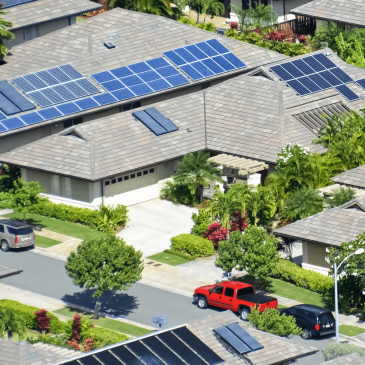Five Common Questions About Purchasing Residential Solar Panels
Making the decision to go solar isn’t always as easy for some homeowners as it is for others. After all, purchasing solar panels is still a hefty investment despite costs having dropped by 80% over the last couple of decades.
Because of the financial responsibility, it is important to ask your installer as many questions as you can to help ensure that you are making the best decision for your energy needs and budget. There is no doubt that going solar delivers far more benefits than risks, but it’s still an investment, and the more you know before jumping in, the better.
If you are on the fence about purchasing solar panels for your home, then here are the five most common questions to ask your installer to help you make your decision.
Is My Roof Ideal for Solar Panels?
Most residential solar panel systems are installed on the roof, so your roof needs to be a primary consideration because not every home has a roof that is ideal for solar. For example, an older roof may need to undergo substantial (and costly) repairs to be able to support solar panels. In other cases, a roof may not be ideally pitched to receive the best sunshine. Or, the roof may be too covered by a heavy canopy of tree branches for the solar panels to work efficiently.
It’s important to note, however, that for each of these problems, there are solutions. From ground-level installed solar arrays to tree removal, there are a variety of different ways for you to get the solar you want for your home.
Will I Need to Get Permits?
Just about every city, county, and state has different rules when it comes to requiring permits for solar panel installations on residential properties. So, it’s important for you to find out whether you need them before having your system installed or you could face expensive fines or even be forced to have your solar panels removed.
Before committing to the installation, ask your local solar installer about permit requirements and then double check by contacting your local zoning office. If your local municipality requires permits for solar, then make sure you apply for them as early as possible because it can take time for permits to be approved.
How Much Money Will Solar Save Me?
Saving money might not be your first priority for going solar, but it is certainly an important benefit of it. There are several things that will impact your savings, such as the size of your system, the type of solar panels being installed, the amount of sunshine your area receives, and more. Asking your installer what type of savings you can expect will help ensure you’re getting the right system for your wants and needs.
What Type of Panels Should I Buy?
The two most common types of solar panels used in residential installations are monocrystalline and polycrystalline panels. While monocrystalline panels are more expensive, they tend to be more energy-efficient, so you have to weigh whether you want savings upfront or over the long haul. Plus, today homeowners have a variety of different options as far as aesthetics go. With choices ranging from black panels, blue panels, mounted panels, and solar shingles, your installer can help you pick the right type for your unique home.
Does My Solar System Come With a Warranty?
Most accredited solar companies will offer a range of different warranties for everything from the equipment that’s installed to their workmanship. In addition, your solar panel manufacturer will also provide a warranty on your panels. So, before signing your installation contract, make sure you know what the warranties are and what exactly they do and don’t cover. As stated earlier, solar is an investment, so you want to make sure your investment is as protected as possible should anything happen to it.
There is no limit to the questions you can ask your solar installer and by all means, you should ask whatever comes to mind. But at the very least, make sure you ask these five questions because each of them will help you avoid buyer’s regret should your system not deliver the results you were hoping for.

